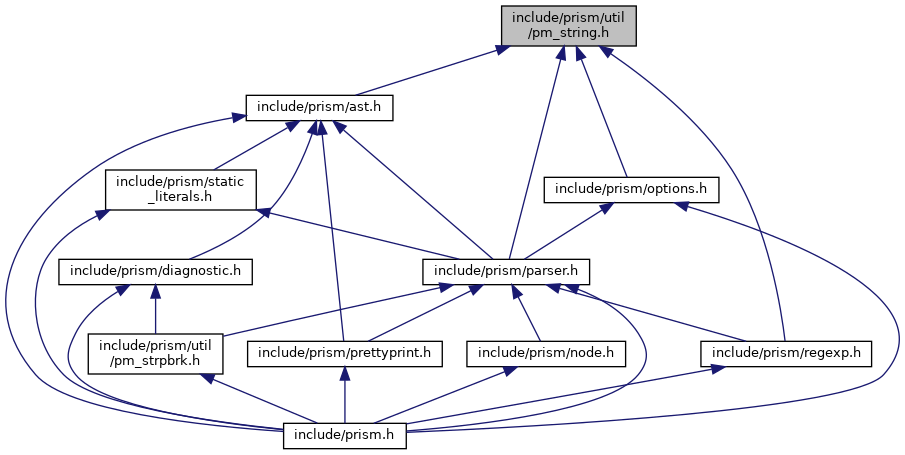A generic string type that can have various ownership semantics. More...
#include "prism/defines.h"#include <assert.h>#include <errno.h>#include <stdbool.h>#include <stddef.h>#include <stdlib.h>#include <string.h>

Go to the source code of this file.
Data Structures | |
| struct | pm_string_t |
| A generic string type that can have various ownership semantics. More... | |
Macros | |
| #define | PM_STRING_EMPTY ((pm_string_t) { .type = PM_STRING_CONSTANT, .source = NULL, .length = 0 }) |
| Defines an empty string. | |
Enumerations | |
| enum | pm_string_init_result_t { PM_STRING_INIT_SUCCESS = 0 , PM_STRING_INIT_ERROR_GENERIC = 1 , PM_STRING_INIT_ERROR_DIRECTORY = 2 } |
| Represents the result of calling pm_string_mapped_init or pm_string_file_init. More... | |
Functions | |
| PRISM_EXPORTED_FUNCTION size_t | pm_string_sizeof (void) |
| Returns the size of the pm_string_t struct. | |
| void | pm_string_shared_init (pm_string_t *string, const uint8_t *start, const uint8_t *end) |
| Initialize a shared string that is based on initial input. | |
| void | pm_string_owned_init (pm_string_t *string, uint8_t *source, size_t length) |
| Initialize an owned string that is responsible for freeing allocated memory. | |
| void | pm_string_constant_init (pm_string_t *string, const char *source, size_t length) |
| Initialize a constant string that doesn't own its memory source. | |
| void | pm_string_ensure_owned (pm_string_t *string) |
| Ensure the string is owned. | |
| int | pm_string_compare (const pm_string_t *left, const pm_string_t *right) |
| Compare the underlying lengths and bytes of two strings. | |
Detailed Description
A generic string type that can have various ownership semantics.
Macro Definition Documentation
◆ PM_STRING_EMPTY
| #define PM_STRING_EMPTY ((pm_string_t) { .type = PM_STRING_CONSTANT, .source = NULL, .length = 0 }) |
Defines an empty string.
This is useful for initializing a string that will be filled in later.
Enumeration Type Documentation
◆ pm_string_init_result_t
Represents the result of calling pm_string_mapped_init or pm_string_file_init.
We need this additional information because there is not a platform-agnostic way to indicate that the file that was attempted to be opened was a directory.
Function Documentation
◆ pm_string_sizeof()
| PRISM_EXPORTED_FUNCTION size_t pm_string_sizeof | ( | void | ) |
Returns the size of the pm_string_t struct.
This is necessary to allocate the correct amount of memory in the FFI backend.
- Returns
- The size of the pm_string_t struct.
This is necessary to allocate the correct amount of memory in the FFI backend.
◆ pm_string_shared_init()
| void pm_string_shared_init | ( | pm_string_t * | string, |
| const uint8_t * | start, | ||
| const uint8_t * | end | ||
| ) |
Initialize a shared string that is based on initial input.
- Parameters
-
string The string to initialize. start The start of the string. end The end of the string.
◆ pm_string_owned_init()
| void pm_string_owned_init | ( | pm_string_t * | string, |
| uint8_t * | source, | ||
| size_t | length | ||
| ) |
Initialize an owned string that is responsible for freeing allocated memory.
- Parameters
-
string The string to initialize. source The source of the string. length The length of the string.
◆ pm_string_constant_init()
| void pm_string_constant_init | ( | pm_string_t * | string, |
| const char * | source, | ||
| size_t | length | ||
| ) |
Initialize a constant string that doesn't own its memory source.
- Parameters
-
string The string to initialize. source The source of the string. length The length of the string.
◆ pm_string_ensure_owned()
| void pm_string_ensure_owned | ( | pm_string_t * | string | ) |
Ensure the string is owned.
If it is not, then reinitialize it as owned and copy over the previous source.
- Parameters
-
string The string to ensure is owned.
If it is not, then reinitialize it as owned and copy over the previous source.
◆ pm_string_compare()
| int pm_string_compare | ( | const pm_string_t * | left, |
| const pm_string_t * | right | ||
| ) |
Compare the underlying lengths and bytes of two strings.
Returns 0 if the strings are equal, a negative number if the left string is less than the right string, and a positive number if the left string is greater than the right string.
- Parameters
-
left The left string to compare. right The right string to compare.
- Returns
- The comparison result.
Returns 0 if the strings are equal, a negative number if the left string is less than the right string, and a positive number if the left string is greater than the right string.